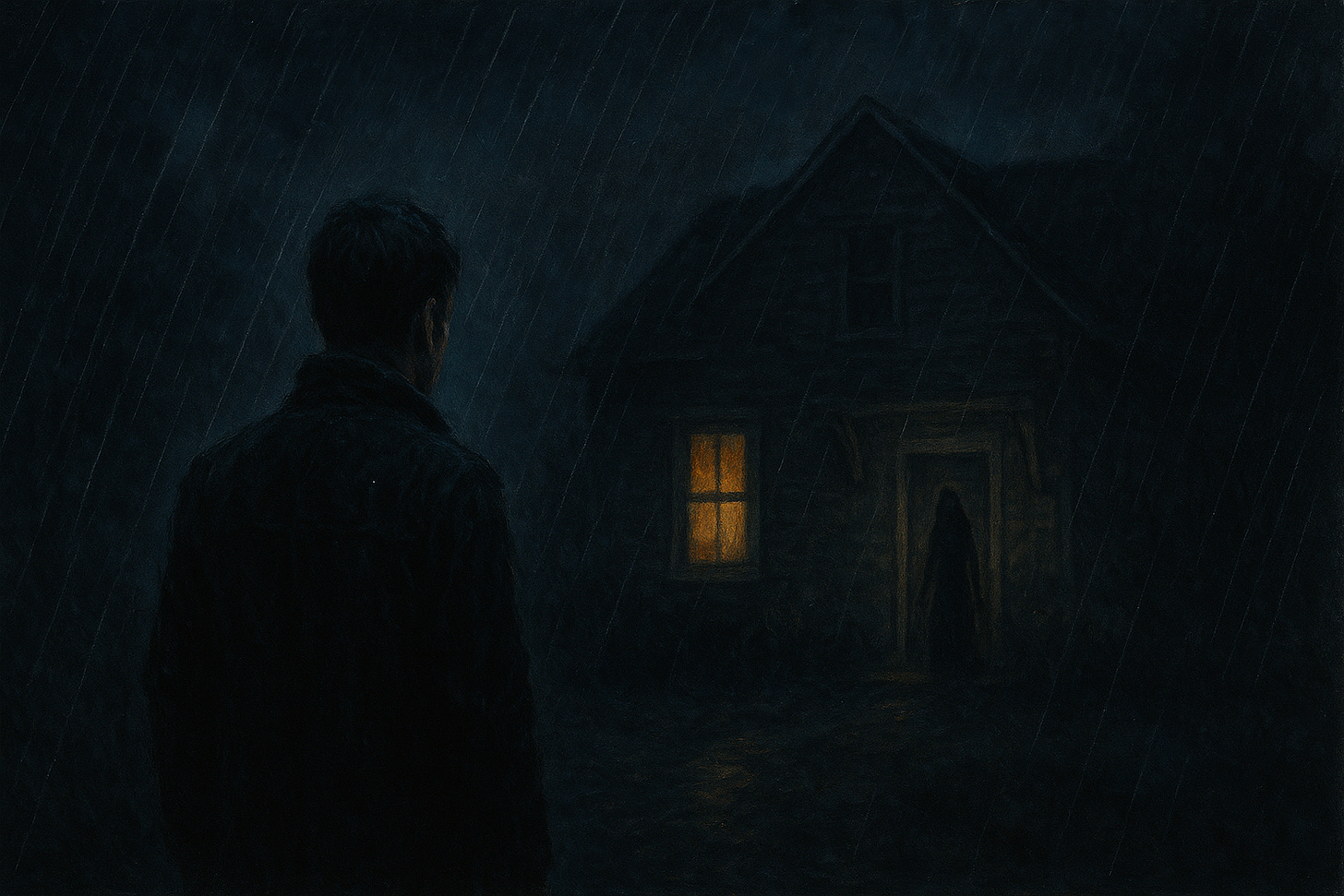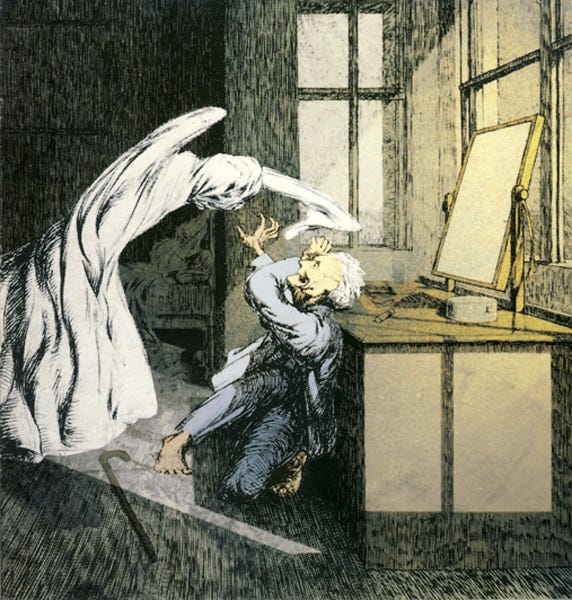In the Past, Monsters Were Real
Maybe monsters did exist, in the past. Then Thomas Edison killed them.
The monsoon came early this year. A storm swept through town in June and besieged the walls of my house, all day and throughout the night. Lashing gales and crashing rain assaulted the storm shutters. The clamor heightened around two in the morning; I was jolted from sleep then, disoriented and tangled in covers, not certain in which bed I lay, halfway between waking and dreaming. The rain smashed against the window just above my head. The gales screamed around me.
That was when I heard the woman. Through the window across the room, calling from the house’s back door:
“Please! Let me in! Let me in!”
In my dazed and unalert state I dismissed the voice as a hallucination. The hourglass of my consciousness drained back into reality, but for a long time I thought, surely, no one could be there.
But I heard the security gate bang. I heard the woman scream again, voice less distinct. I stirred, realizing that someone was surely in the yard, and looked out the window to see.
It was too dark. The rain came down hard, and rain fogged the glass. I went around to the front door and flicked on the lights—to let the woman in, to check if she were real.
No one was outside. The woman was gone.
In that state of half-slumber, roused by the storm, I really had heard a woman begging to be let in. I remember her voice. The sound was “real,” in the sense that any noise descrambled by our minds is “real.” But it is obvious in retrospect that it was an auditory hallucination, caused by a tired mind’s misinterpretation of the keening wind outside my windows.
It was a very dark and very stormy night. Without powerful lights mounted outside the door, I never would have been able to see, without venturing into the rain, that there was no one outside. Perhaps I would not have been brave enough to open the door without the assurance that it was safe to do so. Then how could I have been certain that the woman hadn’t been real?
Consider this same encounter in the year 1800. In the dead of night, during a long storm, a woman screams for help beyond my window. At first I dismiss it for a trick of the mind, but when the screams persist, I investigate.
I see no woman through the glass. But it’s challenging to tell. At most I might have an oil lantern to light my way, but even so much as a candle would be difficult to ignite in the dark without a pre-existing flame. The shadows around me are viscous at night. I am keenly aware that I am a diurnal creature, acting in a time God did not intend for me.
The woman’s screams have stopped. I hear only the wind. But I still cannot be certain she is gone. I do not know that the woman was a hallucination. I am too afraid to open the door, and so return, warily, to bed.
When I relate this story to my friends the next day, each have had similar experiences. They have never seen the woman calling for help during storms, but neither have they seen with some clear source of light that she is false. Over time, as we tell these stories, we propose explanations. Perhaps there really is a woman whose spirit haunts our village. We call her Screaming Susan and speculate that she was a young girl thrown out from her father’s home during a terrible storm. No stranger let her in, and she drowned in the rain. Now she returns at night to relive those final moments. One man says he thinks he caught a glimpse of her once, through his window. New details are added over time.
In this way, a ghost story is born. At its heart is an element of truth, and the need to understand.
This story seems ridiculous in the modern day. Ghosts are not real. They are not a very good explanation for anything. But for almost all of human history, belief in the supernatural has been completely ubiquitous. Today we stand atop a corpus of enlightenment that seeks to deny the existence of the otherworldly, but it is only because I have the language to understand what an “auditory hallucination” is that I can explain away an obvious apparition, rather than to say it was a ghost or a monster or a message from the gods as my ancestors might have.
But I don’t think the Enlightenment is what killed the visceral belief in the paranormal that pervaded the past. Reading folklore today, when I consider what it must have been like to live in the stories of monsters and demons, I think it was humanity’s literal enlightenment that spelled the end for a world of magic and monsters.
For many months, rats infested my ceiling. You would not believe how loud these tiny aberrations were. Anyone who heard them would have sworn homeless men were holding a fiesta in the walls. For weeks I had no clue what they were, until I set up a trail cam and caught the fuckers running around my kitchen late at night.
Without that trail cam, I wouldn’t have thought they were rats. I would have thought my house was haunted.
This ancient house I live in is becursed by strange sounds. A rapping, tapping noise still sometimes comes from the kitchen. Noises bang out from the yard and basement. The walls groan like old men rising from their chairs. More than once I have sworn that a burglar has broken in, because some strange noise pounded from one room or another.
But always I turn the light on, and I see that no one is there. No one and nothing. If I go outside with a flashlight I might realize that the banging from outside has, somehow, despite its volume, been caused by a rabbit stuck in my fence.
The revolution in technology since the end of the 1800s has completely changed how we live. We all know that the Internet didn’t exist before the 1980s, or that people rode horses and drove carriages before 1900. No one forgets that airplanes didn’t exist before the last century. As a Type 1 diabetic, I am keenly aware that I would be dead many times over had I lived any time before 1922.
But how often do you consider that light was a luxury before the invention of matches? It often comes up in my novels. In the book I’m currently writing, the most useful spell any character can know is one of flame or illumination—to have a flashlight powered by your voice, when contesting with the darkness. Yet this is no magic in the modern day. It’s something we take entirely for granted.
But before friction matches, there was no easy way to light your surroundings, even with a candle. A hearth had to be tended constantly. Shadow was the endless enemy. Any task at all at night was challenging. The lightbulb fundamentally changed humanity’s relationship with day and night. In so doing, it also changed our relationship with the supernatural.
We have all had cameras and flashlights in our pockets for twenty years. In that time we have learned that there is nothing hidden in the shadows of Earth. No UFOs, no monsters beyond men, and no ghosts. When something happens in the dark, we can shine light on it. Each ray from a flashlight is a tiny, instantaneous exorcism. We are so numb to this miracle that it has become part of our instinct; when I worked in a haunted house last year, I realized that nearly every visitor would pull out his or her flashlight the moment he entered complete darkness—even voluntarily.
Of course, using your flashlight in a haunted house ruins the experience, as well as blinding the actors. But spoiling the horror is just the point. As light tears the horror from the carnival ride, so too does it tear the horror from life. An illuminated world is one where ghosts and monsters cannot exist.
I don’t believe in ghosts. There are no cryptids I think might be real. But the past was a dark and scary place, full of strange sounds and unknowable mysteries. If I’d had to live there, by the light of candles and lanterns, even in the Age of Enlightenment, I think I would have been just as superstitious as anyone else. And I think you would have been, too.
Maybe the thesis of this post is so obvious it goes without saying, but I couldn’t get it out of my head once it had occurred to me. For some reason, though I never really intended it to be found by anyone, this blog has begun receiving a fairly large number of visitors each month. I’ve been preoccupied with other writing projects and don’t have much interest in pop culture anymore. But I might start updating this blog more regularly, depending on how I feel. No promises.



